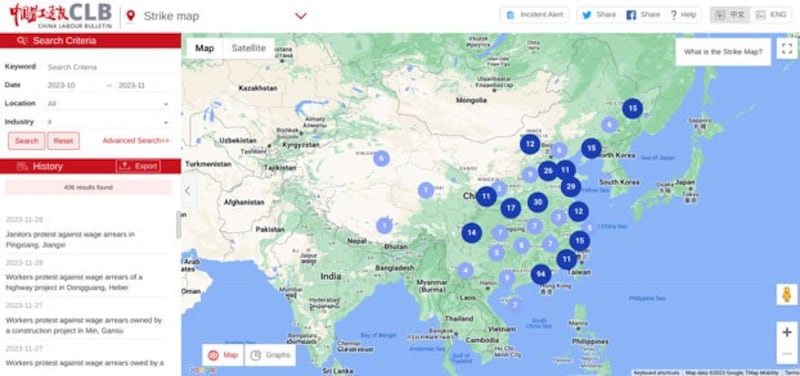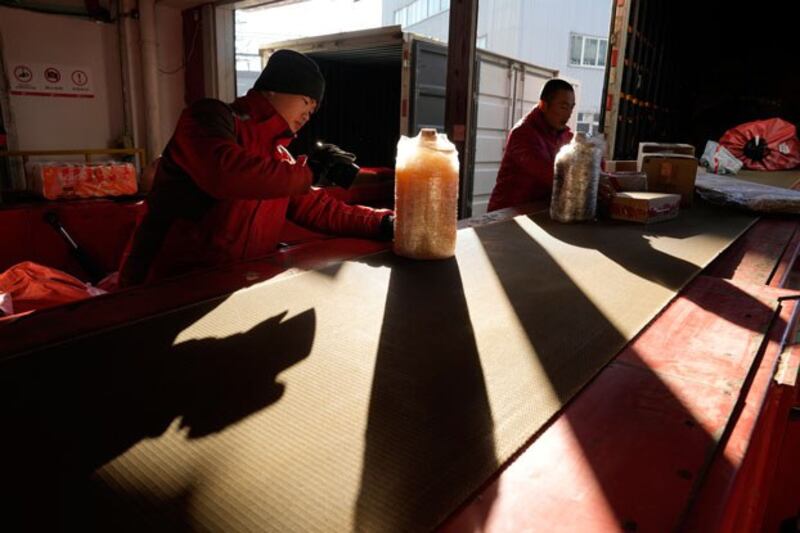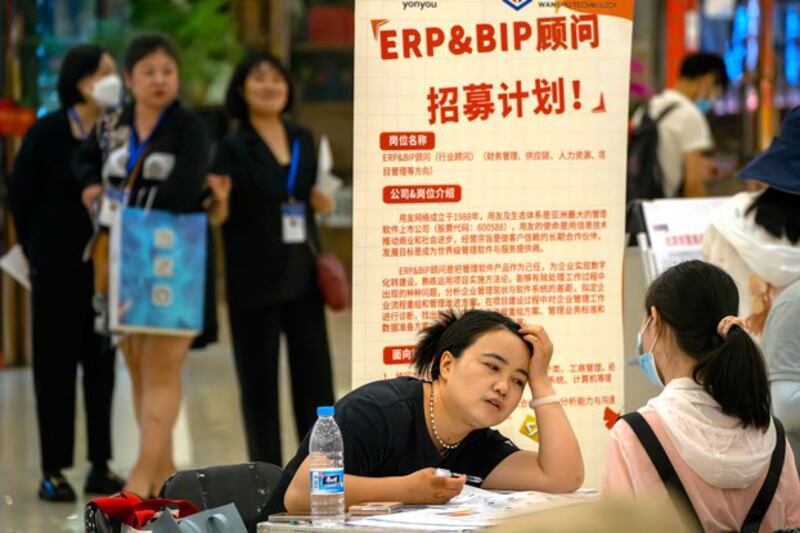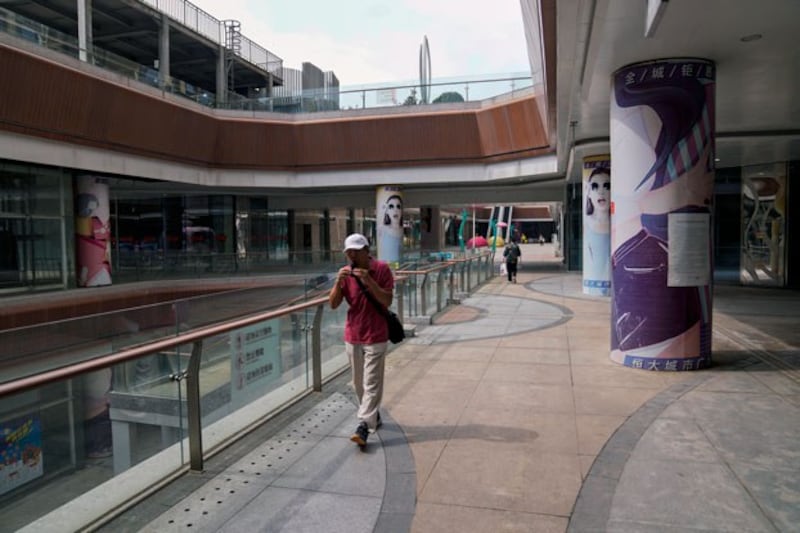At a time when China's hundreds of millions of migrant workers might normally be hoping to earn some extra cash ahead of the Lunar New Year festivities, the struggling economy has left employers unable to pay wages, or forced companies to shut down facilities and lay off staff, according to residents and news reports.
Dozens of employees staged a protest at sudden layoffs at a China Telecom facility in the northern province of Shaanxi, according to the Hong Kong-based China Labour Bulletin's Strike Map of industrial disputes.
The map showed more than 400 disputes taking place across China during October and November, suggesting that for many workers, economic hardship is beginning to bite.

Hundreds of workers also turned out to protest the closure of a state-owned truck-maker in Zhumadian city, with employees demanding better compensation or relocation packages, the map showed, citing footage uploaded to the video-sharing platform Douyin that has since been deleted.
TikTok owner ByteDance is looking to sell its gaming unit Moonton Technology, just two years after acquiring it, and planning to cut jobs at its virtual reality arm Pico, Reuters reported earlier this month.
Companies are also putting employers on early furlough in a bid to save on staffing costs, telling them not to come back until after the Lunar New Year holiday is over, in mid-to-late February.
Henan's Xinya Steel Plant recently announced it would suspend production for more than three months, and that employees would receive 50% of their basic salary during the holiday period, while automaker NIO will cut its workforce by 10% this month, according to a report on the financial news site Caixin.

Employees in the tech sector said they had been particularly hard hit.
An employee at a technology company in Shanghai who declined to be named for fear of reprisals said that a number of tech companies in Shanghai and Shenzhen have folded in recent weeks, or have announced layoffs.
"They're no longer developing new products, and they are laying off technical staff, including some at middle management level," they said. "Once these people leave, I don't think they'll be coming back to Shanghai."
Dozens of similar reports are emerging daily on social media platforms like Weibo, with unconfirmed reports of mass layoffs and closures around the country, prompting people to go back to their hometowns.
People heading home early
"My friend recently came back home from a southern city," a resident of the eastern province of Jiangsu who gave only the surname Yang told Radio Free Asia this week. "Business was pretty bad where he was, so he came back to his hometown to try to find a job."
A resident of the southern city of Shenzhen, once part of China's industrial powerhouse that drove its export-led economy, said plenty of workers in the city are heading back home months ahead of the usual mass migration for Lunar New Year on Feb. 10, 2024.
"It's still only November, but there are actually a lot of people going home from Shenzhen," she said. "I heard millions have left Shenzhen early."
While going home early to beat the Lunar New Year travel rush is nothing new, she said this year's exodus is very early indeed.
"What on earth is going on?" she said.
Long-term plans difficult
Financial commentator Cai Shenkun said that as the ruling Chinese Communist Party under Xi Jinping keeps expanding its control of the economy, including the private sector, many businesses are left unable to make long-term plans.
"Nobody has any confidence in the future any more, not companies, not individuals, not foreign investors or officials," Cai said. "Neither companies nor individuals are making complex and long-term plans."
"It's not just individuals – businesses are also only thinking about how to survive from one day to the next," he said.

Meanwhile, those employers that are still in business are having trouble paying their people, with hundreds of disputes listed across China on the Strike Map as being over "wage arrears."
Cai said the government's recent package of 25 measures aimed at supporting the private sector had little substance to offer.
"If they want to support the private sector, they need to create a favorable environment," he said. "That certainly doesn't exist right now."
"Private enterprises are being completely excluded, while [officials] just mouth slogans without any substance," he said.
An employee at a Shenzhen-based technology company who gave only the surname Ke for fear of reprisals said his company has just laid off 20% of its workforce, largely due to a lack of government research and development grants.
"The government used to make grants to certain tech companies to develop new projects, while some ... companies could get government subsidies ... for research and development, for example, in semiconductor technology," Ke said.
"But now they can't even pay wages, let alone engage in costly research."
"As state funding runs out, companies are going bankrupt," he said.
Belly up
Moxing Semiconductor, OPPO's Zheku Technology and Geely's Star Meizu have all shut their doors in recent days, with the sudden loss of nearly 100 jobs at Moxing, a chip design joint venture under TCL Technology Group.
Ke estimated that more than 100 small and medium-sized tech companies have gone out of business in Shenzhen this year, as government grants and subsidies dry up.
"Back in 2017, 2018, the government would give us, say 30 million or 50 million yuan per project," to develop cutting-edge technologies, he said. "I was burning through money back then, believing I could develop semiconductors and so on, but in the end I couldn't."

Foreign companies are also heading out of China, with Walmart recently announcing it would move its procurement center to Vietnam.
Yet, according to state media, the economic outlook is rosy.
"Economic performance in 31 provinces, autonomous regions and municipalities was generally good during the first three quarters, with more than half growing faster than the national rate," state broadcaster CCTV reported on Nov. 1.
It cited robust consumer sales in the central province of Hubei and claimed a massive rebound in purchases of electric vehicles, smartphones and other consumer goods, presumably in the wake of the lifting of COVID-19 restrictions in December 2022.
Translated by Luisetta Mudie. Edited by Malcolm Foster.
